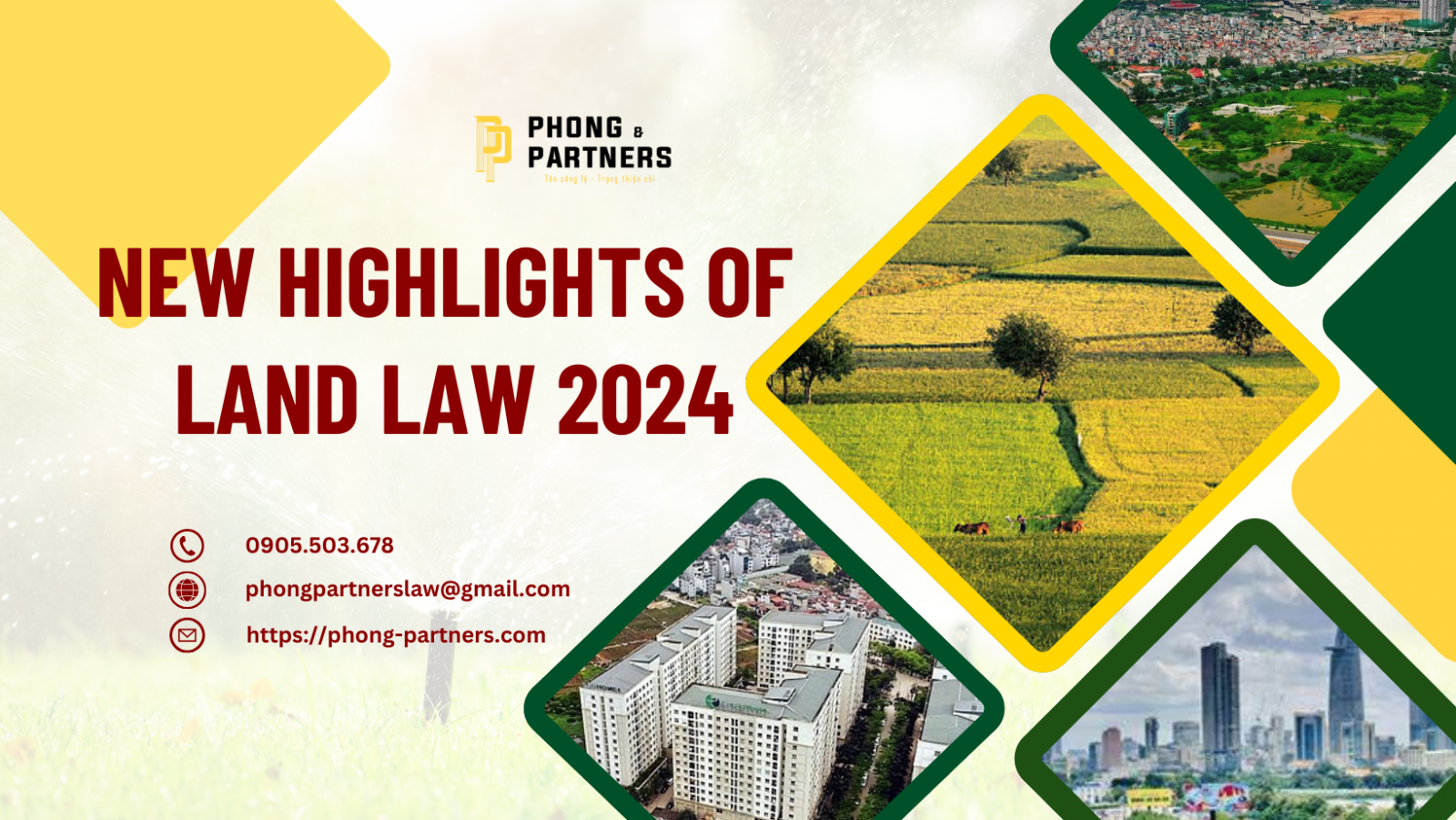First, expanding the limit for receiving transfer of agricultural land use rights of individuals.
One of the notable new points of Land Law 2024 is the expansion of land use rights for land users. Accordingly, the limit for receiving the transfer of agricultural land use rights of individuals shall not exceed 15 times the limit for agricultural land allocation of individuals for each type of land specified in Clauses 1, 2 and 3, Article 176 of Land Law 2024. This provision is a progressive point because it will create conditions for more effective use of agricultural land, thereby promoting the agricultural sector to develop more rapidly, sustainably and effectively, firmly ensuring national food security, and increasingly renewing the face of the countryside.
(Limit prescribed in Land Law 2013: not more than 10 times).
Second, abolishing the land price framework and issuing the new land price list from
Land Law 2024 has removed the land price framework. At the same time, according to Article 159 of this Law, provinces and district-level cities will announce a new Land Price List that will be applied from January 1, 2026. Every year, the Provincial People's Committee must submit to the Provincial People's Council for decision on adjusting, amending and supplementing the land price list for promulgation and application from January 1 of the following year. In case it is necessary to adjust, amend and supplement the year land price list, the Provincial People's Committee is responsible for submitting to the Provincial People's Council for decision.
(Regulations of 2013 Land Law: The land price list is periodically developed every 5 years).
Third, individuals who do not directly produce agriculture are still allowed to receive transfers of rice-growing land.
According to 2013 Land Law, households and individuals who are not directly involved in agricultural production are not allowed to receive transfers or gifts of land use rights for rice cultivation. However, Land Law 2024 has removed this provision.
In addition, Article 45 of Land Law 2024 also stipulates: Individuals who are not directly involved in agricultural production and receive a transfer or gift of the right to use rice-growing land exceeding the limit prescribed in Article 176 of this Law must establish an economic organization and have a plan to use rice-growing land including the contents prescribed in Clause 6 of this Article and be approved by the district-level People's Committee, except in cases where the recipient of the donation is an heir.
This regulation helps to increase the efficiency of land use, while creating flexibility in the management and allocation of land resources. Rice fields can be transferred to those who are able and willing to invest in agriculture, instead of being limited to those who directly produce them, while reducing the abandonment rate.
Fourth, unify the name of the Certificate of land use rights and ownership of houses and other land-attached assets "red book, pink book"
Depending on each period, in Vietnam there are different types of certificates such as Certificate of land use rights; Certificate of house ownership and land use rights; Certificate of house ownership. From December 10, 2009, the Ministry of Natural Resources and Environment issued a new form of certificate applicable nationwide called Certificate of land use rights, ownershipof houses and other land-attached assets (certificate with pink cover). Land Law 2013 and its implementing documents inherit this name. Clause 16, Article 13 of Land Law 2013 clearly states: "Certificate of land use rights, ownership of houses and other land-attached assets is a legal document for the State to confirm the legal land use rights, ownership of houses and other land-attached assets of the person who has the land use rights, ownership of houses and other land-attached assets ". Currently, the official name of "red book, pink book" is Certificate of land use rights, ownership of houses and other land-attached assets.
However, according to the provisions of Land Law 2024, from January 1, 2025, the "red book, pink book" will have the prescribed name of Certificate of land use rights and ownership of land-attached assets. Accordingly, the Certificate of land use rights and ownership of land-attached assets is the legal document for the State to confirm the legal land use rights and ownership of land-attached assets of the person who has the land use right and ownership of land-attached assets. The land-attached assets that are granted a Certificate of land use rights and ownership of land-attached assets are houses and construction works attached to land according to the provisions of law.
Fifth, land can only be reclaimed after handing over the housing for resettlement and supporting an amount for people whose land has been reclaimed.
Clause 6, Article 91 of Land Law 2024 clearly states: The approval of compensation, support, resettlement plans and resettlement arrangements must be completed before a decision on land acquisition is made. Clause 5 of this Article also stipulates that the resettlement area must be completed the conditions of technical infrastructure and synchronous social infrastructure according to the detailed planning approved by the competent authority. This provision aims to ensure the maximum rights of the people, avoiding the situation of having to wait or live temporarily.
In addition, Land Law 2024 also stipulates support for people whose land is recovered with other support such as support for moving livestock, support for dismantling, demolishing, and moving the land-attached assets that are part of construction works under a certain-term construction permit according to the law on construction, but by the time of land recovery, the permit has expired.
These new regulations bring many important benefits, not only ensuring the rights of the people but also creating favorable conditions for the implementation of socio-economic development projects. This is an important step forward in the development and implementation of policies related to land and resettlement in Vietnam.

Sixth, households are not land users.
According to Article 4 of Land Law 2024, land users do not include households; this subject is only regulated in Land Law 2013.
The regulation that households are not land users is necessary and appropriate, which contributes to overcoming the difficulties and shortcomings encountered in the practical application process. In fact, determining the land use rights of households in the form of joint ownership by shares and determining the use value of each member for the joint land will be based on the origin of assets, contributions, and creation of assets of each member in that household, but in reality, the determining the contributions of members in the household is very difficult and complicated.
Seventh, amending regulations on land classification
Land Law 2024 has many new provisions to resolve outstanding issues related to land, including the handling of land granted by the wrong authority. Clause 4, Article 140 of the revised Land Law stipulates that in cases land is granted by the wrong authority to households and individuals from July 1, 2014 to before January 1, 2025 (the effective date of Land Law 2024), if the following conditions are met, a red book will be granted: "The commune-level People's Committee where the land is located confirms that there is no dispute, is in accordance with the land use planning, and the land user has documents proving that he/she has paid money to use the land".
Legalizing the land granted by the wrong authority will minimize land disputes, creating stability and order in land management.
Eighth, supplementing regulations on citizens' rights and obligations regarding land
Unlike Land Law 2013, in addition to the rights and obligations of land users, Land Law 2024 also supplements regulations on the rights and obligations of citizens regarding land in Articles 23, 24, and 25. Accordingly, citizens' rights regarding land include: “1. Participating in the building, giving opinions, and supervising the completion and organization of the implementation of land policies and laws; 2. Participating in state management, giving opinions, discussing and making recommendations, and reflecting to state agencies on land management and use; 3. Rights to equality and gender equality in land management and use; 4. Participating in auctions of land use rights, bidding to select investors to implement projects using land in accordance with the provisions of law; requesting the State to allocate land, lease land without auctioning land use rights, without bidding to select investors to implement projects using land in accordance with the provisions of law; 5. Receiving transfers, gifts, inheritances, and capital contributions, leasing land use rights; buying, selling, receiving transfers of shares, capital contributions which are land use rights value according to the provisions of law; 6. Implementing the rights of land users according to the provisions of this Law.”
Regarding the right to access land information, citizens have the right to access to land information including: “1. Land use planning, plans, and plans related to land use that have been decided and approved by competent state agencies; 2. Results of land statistics and inventories; 3. Land allocation and lease; 4. Announced land price lists; 5. Compensation, support, and resettlement plans when the State recovers land that have been approved by competent agencies; 6. Results of inspection, examination, and settlement of land disputes; results of settlement of complaints and denunciations about land, results of handling violations of land laws; 7. Administrative procedures on land; 8. Legal documents on land; 9. Other land information as prescribed by law.”
Regarding citizens' obligations towards land: “1. Citizens have the obligation to comply with the provisions of the law on land; 2. Preserving, protecting and developing land resources; 3. Respecting the land use rights of other land users.”
These are new regulations that have not been recorded in Land Law 2013, which demonstrates the progress of Land Law 2024. These regulations record and specifically define the rights and obligations of citizens related to land, thereby helping to promptly and effectively protect the legitimate rights of citizens, as well as ensuring that citizens perform and comply with the obligations set forth in relation to land.
Ninth, supplementing regulations on principles and conditions for land division and land consolidation.
Land Law 2013 does not stipulate principles and conditions for land division and land consolidation. However, Land Law 2024 has added provisions on principles and conditions for land division and land consolidation in Article 220. Adding provisions on principles and conditions for land division and land consolidation in Land Law 2024 is necessary. Specifying the principles and conditions in the Law will create an important legal foundation, thereby the land division and land consolidation will be implemented effectively, safely and completely in accordance with the spirit of the law.
Tenth, decentralization, delegation of authority, and simplification of procedures in land management and use.
Land Law 2024 continues to decentralize land acquisition to localities, and promotes decentralization to district-level People's Committees. It abolishes the requirement to submit to the Prime Minister for written approval for projects using rice-growing land, protective forest land, and special-use forest land for other purposes that are not subject to the National Assembly's decision and the Prime Minister's approval of the investment policy. At the same time, it decentralizes to the provincial People's Councils the decision to change the purpose of projects using rice-growing land, protective forest land, and special-use forest land for other purposes for these projects.
Land Law 2024 also clearly stipulates the announcement and disclosure of administrative procedures on land; responsibilities for implementing administrative procedures on land; procedures for permitting changes in land use purposes; procedures for land allocation and lease. At the same time, Law has added a chapter on the National Land Information System and the National Land Database with regulations on the responsibilities and time for ministries, branches and localities to put the land database system into operation and exploitation.
At the same time, the Law also provides regulations on interconnecting the national land database with the databases of relevant ministries and branches, and regulations on online public services and electronic transactions on land are also recorded to create tools for people and businesses to access and check the process of handling administrative procedures on land by the procedure handling agency in the electronic environment.
Eleventh, Vietnamese people residing abroad are extended land use rights.
Clause 3, Article 4 of Land Law 2024 stipulates that domestic individuals and overseas Vietnamese with Vietnamese nationality are Vietnamese citizens and are collectively referred to as individuals. Accordingly, overseas Vietnamese are Vietnamese citizens and are entitled to fully implement the rights and obligations of land users as domestic individuals.
It can be seen this new regulation brings many benefits and important meanings to Vietnamese people living abroad. Not only does it strengthen the relationship between overseas Vietnamese and their homeland, this policy also promotes investment, economic development, improves the quality of life and encourages the return of overseas Vietnamese to contribute.
Twelveth, amending regulations on land classification
Land Law 2024 and Land Law 2013 both classify land into agricultural land, non-agricultural land, and unused land based on the purpose of land use. However, according to Article 9 of Land Law 2024, other types of agricultural land and other types of non-agricultural land are not listed, and the definition of unused land is revised, accordingly, unused land is the land its purpose of use has not been determined and has not been assigned or leased. This definition is different from the definition prescribed in Land Law 2013, unused land includes the land its purpose of use has not been determined.
Amending regulations on land classification such as Land Law 2024 is necessary, because this not only classifies land in a scientific and comprehensive manner but also serves as a basis for effective planning and land use planning.
Thirteenth, supplementing the authority to resolve land disputes of Commercial Arbitration
According to Clause 5, Article 236 of Land Law 2024, disputes between parties arising from commercial activities related to land shall be resolved by the Court in accordance with the provisions of the law on civil procedure or by the Vietnam Commercial Arbitration in accordance with the provisions of the law on commercial arbitration.
The addition of jurisdiction to Commercial Arbitration will reduce the pressure on the Court system, especially in the context of the increasing number of land disputes. This allows the Court to focus on resolving more complex cases, while improving the efficiency of the entire judicial system. In addition, Commercial Arbitration often has a faster and more flexible dispute resolution process than the Court. This helps the parties involved to reach a quick solution, saving time and costs.
Fourteenth, land allocation and lease through land use rights auction
Land Law 2024 specifically stipulates the “allocation and lease of land through auction of land use rights” for “clean land” created by the State; or “allocation and lease of land through bidding to select investors to implement the investment projects using land” for “land that has not been cleared” in which “the winning investor is responsible for providing capital to implement compensation, support and resettlement as required by the competent state agency” and within 36 months from the date of issuance of the decision recognizing the winning bid results or another period according to the contract signed with the competent state agency, the competent People's Committee must complete the compensation, support and resettlement to allocate and lease land to the winning investor.
This provision ensures consistency and uniformity with the provisions of Chapter VIII of Land Law 2024 on “development, management and exploitation of land funds”. These contents ensure the legitimate and legal interests of land users as well as investors. Accordingly, land users whose land is recovered will be compensated at the correct market price and will be resettled with priority given to on-site resettlement.
Fifteenth, land is used to implement housing projects through agreements on receiving land use rights or having land use rights.
Using land to implement housing projects through agreements on receiving land use rights or having land use rights is one of the outstanding new points in Land Law 2024. According to the provisions of Point b, Clause 1 and Clause 6, Article 127 of Land Law 2024, commercial housing projects can be implemented through agreements on receiving land use rights for residential land; existing land use rights can be used to implement commercial housing projects for residential land or residential land and other land. If necessary, the Government is requested to study and develop a pilot project to submit to competent authorities for submission to the National Assembly for consideration and promulgation of a Resolution allowing the pilot implementation of commercial housing projects through agreements on receiving land use rights or having other land use rights as prescribed by Law.
This is a liberal regulation on land use to implement socio-economic development projects through agreements on receiving land use rights or having land use rights for most socio-economic development projects including social housing projects, except for some restrictions on commercial housing projects. This will create very favorable land use conditions to promote the country's development.
Sixteenth, new points on land prices in calculating non-agricultural land use tax
Reforming regulations on land prices in calculating non-agricultural land use tax is one of the notable new points of Land Law 2024. Article 249 of Land Law 2024 amends Clause 3, Article 6 of Law on Non-agricultural Land Use Tax 2010 on the price of 01 m2 in calculating non-agricultural land use tax as follows:
"The price of 1 m2 of land is the land price according to the land price list corresponding to the purpose of use and is stabilized over a 5-year cycle."
The calculating tax every 5 years helps tax authorities and land users have an accurate and clear basis for calculating taxes, minimizing the inconvenience due to the land prices are not updated promptly. At the same time, this regulation ensures fairness and transparency in tax collection, limiting tax evasion or false declaration of land values.
___________________________________
PHONG & PARTNERS LAW FIRM
PHONG & PARTNERS LAWYER IN TAY NGUYEN
Address: 05 Nguyen Truong To, Dien Hong ward, Pleiku City, Gia Lai
Tel: 0901.955.099
PHONG & PARTNERS LAWYER IN HO CHI MINH CITY
Address: Floor 9, K&M Building, 33 Ung Van Khiem, 25 Ward, Binh Thanh district, Ho Chi Minh City.
Tel: 0905.503.678
Email: phongpartners.hcmc@gmail.com
PHONG & PARTNERS LAWYER IN DA NANG
1. Phong & Partners in Hai Chau - Thanh Khe
Address: 6th Floor, Thanh Loi Building, 249 Nguyen Van Linh, Thanh Khe District, Da Nang.
Tell: 02363.822.678 – 0905.102.425
2. Phong & Partners in Son Tra
Address: 01 Dong Giang, Son Tra District, Da Nang.
Tell: 0905.205.624
3. Phong & Partners in Lien Chieu
Address: 223 Nguyen Sinh Sac, Lien Chieu District, Da Nang.
Tell: 0961.283.093
4. Phong & Partners in Ngu Hanh Son
Address: 03 Chu Cam Phong, Ngu Hanh Son District, Da Nang.
Tell: 0905.579.269
5. Phong & Partners in Cam Le - Hoa Vang
Address: 346 Cach Mang Thang Tam, Cam Le District, Da Nang.
Tell: 0901.955.099
Email: phongpartnerslaw@gmail.com
Website: https://phong-partners.com
Fanpage: https://www.facebook.com/phongpartnerslaw
https://www.facebook.com/luatsugioinguhanhson
https://www.facebook.com/luatsusontra















